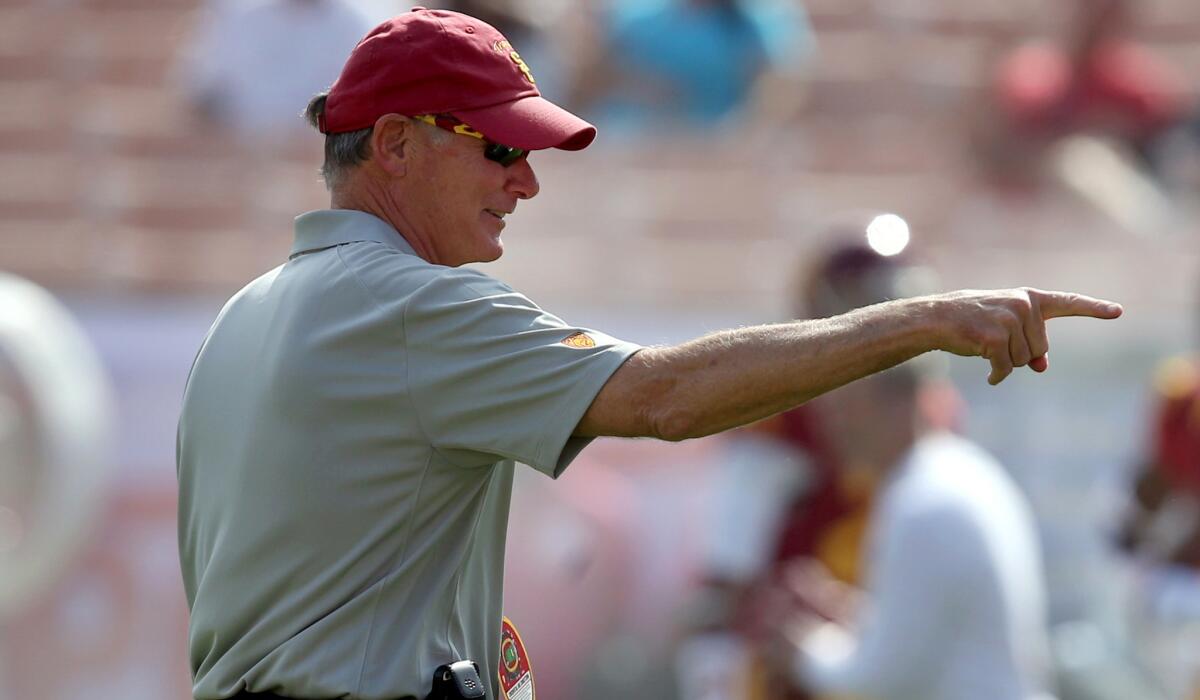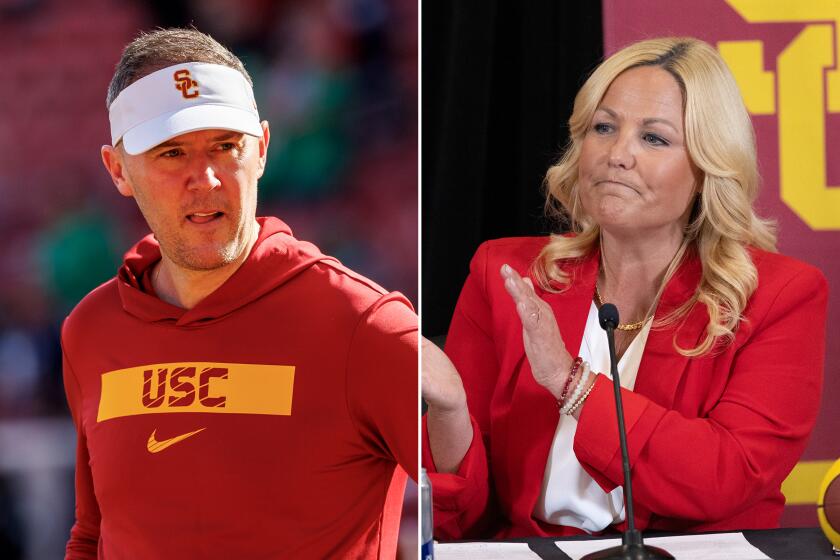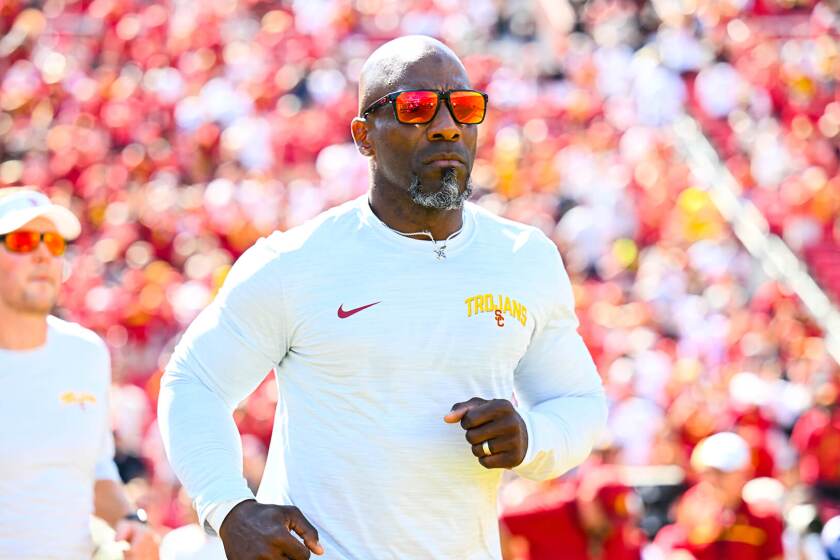USC says unsealed documents in McNair defamation case prove NCAA bias

- Share via
The unsealing of nearly 500 pages of documents in Todd McNair’s defamation lawsuit against the NCAA provided a window into the way the governing body for college sports conducted its investigation and punished McNair and USC.
It was also evident there was a “bias against McNair and USC by and on behalf of the NCAA and its Committee on Infractions,” the university said in a statement on Wednesday.
The statement continued, “We are extremely disappointed and dismayed at the way the NCAA investigated, judged and penalized our university throughout this process.”
McNair and his attorneys have not commented.
The documents included emails and memos by members of the NCAA infractions committee that compared the evidence in the scandal to the Oklahoma City bombing, mocked USC’s response to the matter and derided the hiring of Lane Kiffin as Trojans football coach.
“These recent documents confirm what we’ve believed all along, that we were treated unfairly in this investigation and its penalties,” USC Athletic Director Pat Haden said in the university statement.
Eleanor Myers, one of the infractions committee members, said in a March 2010 email to the group the organization’s enforcement staff “botched” a key interview with McNair, writing the Trojans former running backs coach “did not have a good opportunity” to explain a phone call with sports marketer Lloyd Lake the NCAA used as evidence in the case.
McNair’s attorneys argued in documents “the NCAA fabricated evidence to suit its needs.”
Former USC football coach Pete Carroll, who in the past has not held back in criticizing the NCAA for the sanctions and the way it operated, said he was following the situation.
“I’m interested and anxious to see what happens next,” he said in a brief phone interview from Arizona, where he was attending NFL meetings.
A request for Kiffin’s reaction was made through Alabama’s sports information office, but Crimson Tide Coach Nick Saban allows assistants to speak to the media only a few times a year. Former USC athletic director Mike Garrett, who now oversees Langston University’s athletic program, did not immediately respond to an email seeking comment. The NCAA also did not respond to requests for comment.
Here are some questions and answers as McNair’s lawsuit moves forward:
Will more documents be unsealed and released?
About 200 pages of documents, including emails and portions of depositions, were not included in the NCAA’s filing Tuesday. Those, presumably, were the documents that led Los Angeles Superior Court Judge Frederick Shaller in 2012 to label the NCAA’s investigation “malicious” and “over the top” and say the documents “tend to show ill will or hatred” toward McNair.
“They’re probably not going to become public,” said Michael McCann, a professor at the University of New Hampshire School of Law and a sports law expert. “But it will depend on if there are additional motions by McNair for them to be unsealed.”
Is there legal recourse for USC or former players against the NCAA?
Penn State got back 112 wins after state officials sued the NCAA over its use of a $60-million fine that was part of a 2012 consent decree that resulted from the Jerry Sandusky child-molestation scandal.
The NCAA settled the case.
USC’s sanctions, which included the loss of 30 scholarships over three years, a two-year bowl ban and vacating victories, ended last June.
“You could always file a lawsuit,” McCann said. “But the reality is the NCAA has broad discretion to punish member schools. Even if McNair’s legal argument is correct, that doesn’t mean the university is in the right.
“It seems the nexus between the alleged harm suffered is not quite as strong as it would be at Penn State, where there’s an ongoing argument.”
Michael Buckner, an attorney with the Florida-based Buckner Law Firm who has been involved in numerous NCAA enforcement cases, said USC could have recourse with the NCAA.
“They could go to the executive council of the NCAA to ask for special compensation, dispensation for what went on,” said Buckner, who attended USC but has not represented the school, “that apparently an entity within the NCAA did not follow the rules and therefore tainted the process and possibly influenced the findings of the committee.
“If I was representing USC, I would be asking for additional scholarships over a certain number of years, asking for a waiver above and beyond what NCAA rules permit.
“I would ask the NCAA to give back some of the ones it took away.”
In its statement, USC said it would “determine what further action is appropriate” after it reviewed all of the recently unsealed documents.
What will be the tipping point to change how the NCAA handles these types of cases?
Ramogi Huma, president of the National College Players Assn., which advocates for reform in college athletics, said the tipping point would come “through the lawsuits.”
“None of this would have even come out if not for the lawsuit,” he said, adding, “I think it’s going to be through legal means. Good lawyers will poke holes in this whole ridiculous system.
“The major progress happening in and around college sports is happening because of lawsuits and unionization.”
Will this spark an overhaul of the NCAA’s enforcement system?
That’s what USC and Haden are hoping for.
In its statement, USC said it hoped “the transparency in this case will ultimately lead to review and changes so that all member institutions receive the fair and impartial treatment they deserve.”
Said Haden: “I think these documents are cause for concern about the NCAA’s own institutional controls. It should be concerning to all schools that the NCAA didn’t appear to follow its own rules.”
Buckner said he wasn’t convinced a complete overhaul was required.
“I’ve always been in favor of the NCAA breaking off the Committee on Infractions and actually having a professionalized group of individuals to hear all cases, hiring and training former state or federal judges or distinguished attorneys,” he said.”Hopefully, that would create a better system.”
What’s next?
The appellate court is scheduled to hear the NCAA’s motion to strike McNair’s complaint and dismiss the case.
The court on Tuesday ordered the parties to submit new briefings based on the “newly designated appellate record.” The NCAA’s new opening brief is due May 4. McNair’s new opening brief is due within 30 days after the NCAA files its opening brief.
Thomas Burke, an attorney who represented the Los Angeles Times and New York Times in a 2013 application with the appeals court to unseal documents, said he does not envision litigation by the media companies in the case moving forward.
Twitter: @latimesklein
Twitter: @nathanfenno
More to Read
Go beyond the scoreboard
Get the latest on L.A.'s teams in the daily Sports Report newsletter.
You may occasionally receive promotional content from the Los Angeles Times.








